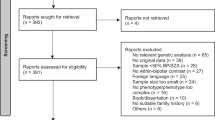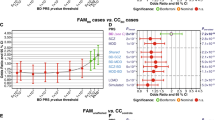Abstract
High lod scores were obtained in several X-linkage studies of bipolar illness under the assumption that a subgroup of manic depression follows an X-linked dominant mode of inheritance. We have previously shown that the segregation patterns do not substantiate this assumption. We now statistically address the lack of evidence for X-linked inheritance by sex-dependently analyzing segregation ratios and clinical data presented in eight positive X-linkage studies. Accordingly, affected males have significantly fewer offspring, a lower mean age and a higher bipolar to unipolar ratio than affected females. There are two possible explanations for these findings: either the X-linked subgroup of bipolar illness has unique features that have not been accounted for clinically, or (more probably) the pedigree structures could also (and might be more likely to) result from ascertaining kindreds following autosomal or multifactorial inheritance only, with exclusion of kindreds encompassing male to male transmission.
Similar content being viewed by others
References
Baron M (1977) Linkage between an X-chromosome marker (deutan color blindness) and bipolar affective illness. Arch Gen Psychiatry 34:721–725
Baron M, Risch N, Mendlewicz J (1982) Differential fertility in bipolar affective illness. J Affect Disord 4:103–112
Baron M, Risch N, Hamburger R, Mandel B, Kushner S, Newman M, Drumer D, Belmaker RH (1987) Genetic linkage between X-chromosome markers and bipolar affective illness. Nature 326:289–293
Baron M, Hamburger R, Sandkuyl LA, Risch N, Mandel B, Endicott J, Belmaker RH, Ott J (1990) The impact of phenotypic variation on genetic analysis: application to X-linkage in manicdepressive illness. Acta Psychiatr Scand 82:196–203
Berrettini WH, Goldin LR, Gelernter J, Gejman PV, Gershon ES, Detera-Wadleigh S (1990) X-chromosome markers and manic-depressive illness. Arch Gen Psychiatry 47:366–373
Del Zompo M, Bocchetta A, Goldin LR, Corsini GU (1984) Linkage between X-chromosome markers and manic-depressive illness. Acta Psychiatr Scand 70:282–287
Gejman PV, Detera-Wadleigh S, Martinez MM, Berrettini WH, Goldin LR, Gelernter J, Hsieh WT, Gershon ES (1990) Manic depressive illness not linked to factor IX region in an independent series of pedigrees. Genomcis 8:648–655
Gershon ES, Targum SD, Matthysse S, Bunney WE (1979) Color blindness not closely linked to bipolar illness. Arch Gen Psychiatry 36:1423–1430
Hebebrand J (1992) A critical appraisal of X-linked bipolar illness: evidence for the assumed mode of inheritance is lacking. Br J Psychiatry 160:7–11
Mendlewicz J, Fleiss JL (1974) Linkage studies with X-chromsome markers in bipolar (manic-depressive) and unipolar (depressive) illness. Biol Psychiatry 9:261–294
Mendlewicz J, Fleiss JL, Fieve RR (1972) Evidence for X-linkage in the transmission of manic-depressive illness. JAMA 222:1624–1627
Mendlewicz J, Linkowski P, Guroff JJ, Van Praag HM (1979) Color blindness linkage to bipolar manic-depressive illness. Arch Gen Psychiatry 36:1442–1447
Mendlewicz J, Linkowski P, Wilmotte J (1980) Linkage between glucose-6-phosphate dehydrogenase deficiency and manic-depressive psychosis. Br J Psychiatry 137:337–342
Mendlewicz J, Sevy S, Brocas H, Simon P, Charon F, Legros S, Vassart G (1987) Polymorphic DNA marker on X chromosome and manic depression. Lancet 1:1230–1232
Neiswanger K, Slaugenhaut SA, Hughes HB, Frank E, Frankel DR, McCarty MJ, Chakravarti A, Zubenko GS, Kupfer DJ, Kaplan BB (1990) Evidence against close linkage of unipolar affective illness to human chromosome 11p markers HRAS1 and INS and chromosome Xq marker DXS52. Biol Psychiatry 28:63–72
Risch N, Baron M, Mendlewicz J (1986) Assessing the role of X-linked inheritance in bipolar-related major affective disorder. J Psychiatr Res 20:275–288
Winokur G, Crowe R (1983) Bipolar illness. The sex-polarity effect in affectively ill family members. Arch Gen Psychiatry 40:57–58
Vogel F, Motulsky AG (1986) Human genetics. Springer, Berlin Heidelberg New York
Author information
Authors and Affiliations
Rights and permissions
About this article
Cite this article
Hebebrand, J., Hennighausen, K. A critical analysis of data presented in eight studies favouring X-linkage of bipolar illness with special emphasis on formal genetic aspects. Hum Genet 90, 289–293 (1992). https://doi.org/10.1007/BF00220081
Received:
Issue Date:
DOI: https://doi.org/10.1007/BF00220081




